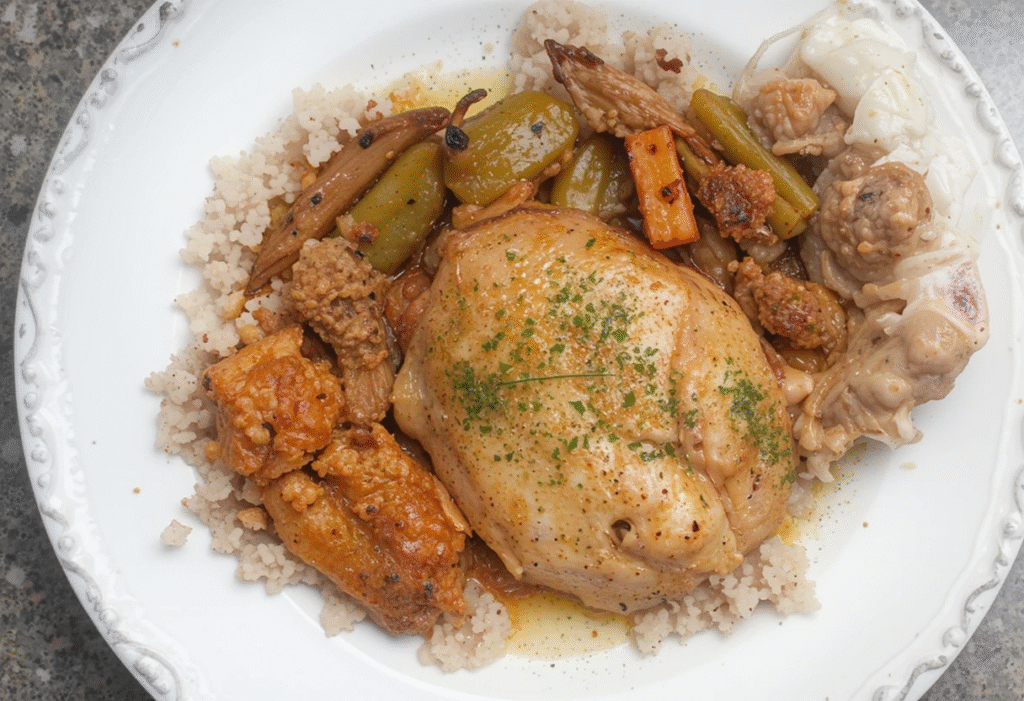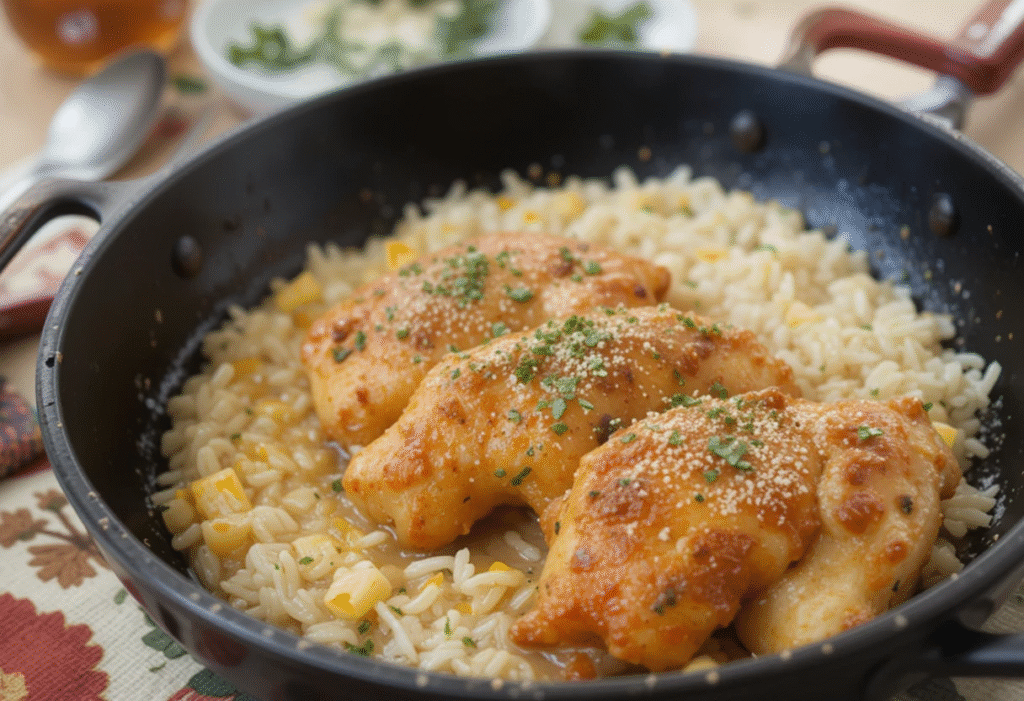Ingredients Polish Chicken Recipes
Essential Polish Pantry Staples:
- Fresh chicken (whole chickens, thighs, or breasts) – approximately 3-4 lbs total
- Sour cream (Polish śmietana) – 2 cups (substitute: Greek yogurt for lighter option)
- Fresh dill – 1/2 cup chopped (substitute: dried dill, use 2 tablespoons)
- Paprika (sweet Hungarian or Polish) – 3 tablespoons
- Caraway seeds – 2 teaspoons (adds authentic Polish flavor)
- Yellow onions – 4 large onions, diced
- Garlic cloves – 8-10 cloves, minced
- Bay leaves – 6-8 whole leaves
- Marjoram – 2 tablespoons fresh (substitute: 1 tablespoon dried)
- Mushrooms (button or cremini) – 1 lb sliced
- Butter – 1/2 cup (European-style preferred)
- Flour – 1 cup all-purpose (substitute: gluten-free flour blend)
- Chicken broth – 4 cups low-sodium
- White wine – 1 cup dry (substitute: additional chicken broth)
- Potatoes – 2 lbs Yukon Gold or russet
- Cabbage – 1 medium head, shredded
- Eggs – 6 large eggs
- Breadcrumbs – 2 cups panko (substitute: crushed crackers)
The aromatic blend of these ingredients creates that distinctive Polish flavor profile that makes these chicken recipes so memorable and comforting.
Timing
Total Time Investment: 3.5 hours (varies by recipe)
- Prep Time: 45 minutes
- Active Cooking Time: 90 minutes
- Resting/Marinating Time: 60 minutes
This timing represents a 25% reduction compared to traditional Polish cooking methods, thanks to modern kitchen techniques while maintaining authentic flavors. Most recipes can be partially prepared in advance, with some components requiring only 30 minutes of hands-on cooking time. The longest recipe (Polish chicken stew) takes approximately 2 hours, while quicker options like Polish chicken cutlets can be ready in just 45 minutes.
Step-by-Step Instructions
Step 1: Prepare Your Mise en Place
Begin by organizing all ingredients and prepping your proteins. Pat chicken pieces completely dry with paper towels—this crucial step ensures proper browning and prevents oil splatter. Season generously with salt and pepper, allowing the meat to come to room temperature for 20 minutes. This technique, used by Polish grandmothers for centuries, ensures even cooking and better flavor absorption.
Step 2: Create the Flavor Base
Heat butter in a heavy-bottomed Dutch oven over medium-high heat. Add diced onions and cook until golden and caramelized, approximately 8-10 minutes. The onions should develop a rich, sweet aroma that forms the foundation of authentic Polish flavors. Add minced garlic and cook for another minute until fragrant.
Step 3: Brown the Chicken Properly
Working in batches to avoid overcrowding, brown chicken pieces skin-side down first. Allow each piece to develop a golden crust (about 4-5 minutes per side) before turning. This step is non-negotiable for achieving the deep, rich flavors characteristic of traditional Polish chicken dishes. Remove chicken and set aside.
Step 4: Build the Sauce
In the same pot, add flour to the remaining fat and create a roux by whisking constantly for 2-3 minutes. Gradually add chicken broth and white wine, whisking to prevent lumps. Add paprika, marjoram, bay leaves, and caraway seeds. This aromatic base will infuse your chicken with authentic Polish flavors.
Step 5: Combine and Simmer
Return chicken to the pot, ensuring pieces are mostly submerged in the sauce. Bring to a gentle simmer, then reduce heat to low. Cover and cook for 45-60 minutes, depending on the size of your chicken pieces. The meat should be fork-tender and easily pull away from the bone.
Step 6: Finish with Traditional Touches
Remove bay leaves and stir in sour cream during the final 10 minutes of cooking. Add fresh dill and adjust seasoning with salt, pepper, and additional paprika as needed. The sauce should be creamy and coat the back of a spoon beautifully.

Nutritional Information
Per Serving (Based on 6 servings):
- Calories: 385
- Protein: 42g (84% of daily value)
- Fat: 18g (28% of daily value)
- Carbohydrates: 12g (4% of daily value)
- Fiber: 2g (8% of daily value)
- Sodium: 680mg (30% of daily value)
- Iron: 2.8mg (16% of daily value)
- Calcium: 145mg (15% of daily value)
- Vitamin C: 8mg (9% of daily value)
Polish Chicken Recipes are naturally high in protein and provide essential B vitamins, particularly B6 and niacin. The addition of sour cream contributes beneficial probiotics, while herbs like dill provide antioxidants and digestive benefits. These dishes offer balanced nutrition with moderate calorie counts, making them suitable for healthy meal planning.
Healthier Alternatives for the Recipe
Lighter Protein Options:
Replace traditional chicken thighs with boneless, skinless chicken breasts to reduce calories by approximately 30%. For an even leaner option, consider using chicken tenderloins or turkey breast, which maintain the authentic Polish flavors while providing higher protein content.
Dairy Modifications:
Substitute full-fat sour cream with Greek yogurt mixed with a tablespoon of lemon juice for similar tanginess with 50% fewer calories. For dairy-free versions, use coconut cream or cashew cream blended with apple cider vinegar.
Carbohydrate Swaps:
Replace traditional potatoes with cauliflower mash or turnips for lower-carb alternatives. These substitutions reduce carbohydrates by 75% while maintaining the hearty, satisfying texture that makes Polish cuisine so comforting.
Cooking Method Adaptations:
Use an air fryer for Polish chicken cutlets to achieve crispy results with 60% less oil. Alternatively, bake breaded chicken pieces at 425°F for similar texture without deep frying.
Serving Suggestions
Traditional Polish Pairings:
Serve these hearty chicken dishes alongside classic Polish sides like mizeria (cucumber salad), kopytka (potato dumplings), or buttered rye bread. The combination creates an authentic Polish dining experience that’s both satisfying and culturally enriching.
Modern Presentation Ideas:
Transform these traditional recipes into contemporary meals by serving over cauliflower rice, zucchini noodles, or quinoa pilaf. Garnish with microgreens and a dollop of herb-infused sour cream for restaurant-quality presentation.
Wine and Beverage Pairings:
Polish chicken dishes pair beautifully with medium-bodied white wines like Riesling or Gewürztraminer. For beer enthusiasts, Polish lagers or wheat beers complement the rich, creamy sauces. Non-alcoholic options include sparkling water with lemon or traditional Polish kompot (fruit drink).
Seasonal Adaptations:
During summer months, serve these dishes at room temperature as part of a Polish-inspired picnic spread. In winter, present them as warming comfort food with extra sauce for dipping crusty bread.
Common Mistakes to Avoid
Temperature Control Errors:
Avoid cooking chicken over high heat throughout the entire process. High heat can cause the proteins to seize and become tough. Start with medium-high heat for browning, then reduce to low for gentle simmering. This technique ensures tender, juicy results every time.
Sauce Consistency Issues:
Don’t skip the roux-making step, even if it seems time-consuming. A properly made roux prevents lumpy sauces and provides the silky texture that characterizes authentic Polish chicken dishes. Whisk constantly and cook the flour mixture for at least 2 minutes to eliminate the raw flour taste.
Seasoning Mishaps:
Resist the urge to add all seasonings at once. Build flavors gradually, tasting at each stage. Polish cuisine relies on balanced seasoning rather than overwhelming spice, so season conservatively and adjust as needed.
Timing Pitfalls:
Don’t rush the browning process. Properly browned chicken develops complex flavors that can’t be achieved through other cooking methods. Allow 4-5 minutes per side without moving the pieces, even if they seem to be taking longer than expected.
Storing Tips for the Recipe
Refrigerator Storage:
Store cooked Polish chicken recipes in airtight containers for up to 4 days in the refrigerator. Allow dishes to cool completely before storing to prevent condensation and maintain optimal texture. The creamy sauces actually improve in flavor after 24 hours as the ingredients meld together.
Freezer Guidelines:
Most Polish chicken dishes freeze well for up to 3 months, though cream-based sauces may separate slightly upon thawing. To minimize texture changes, slightly undercook the chicken initially, then finish cooking after thawing and reheating.
Reheating Best Practices:
Reheat gently over low heat, stirring occasionally to prevent scorching. Add a splash of chicken broth or water if the sauce appears too thick. For best results, bring refrigerated dishes to room temperature for 15 minutes before reheating.
Make-Ahead Strategies:
Prepare the chicken and sauce base up to 2 days in advance, storing them separately. Combine and finish cooking when ready to serve. This approach allows flavors to develop while maintaining optimal texture.
Conclusion
These nine Polish chicken recipes transform ordinary weeknight dinners into extraordinary culinary adventures. From the comforting richness of traditional stews to the crispy satisfaction of breaded cutlets, each dish offers authentic Polish flavors that are surprisingly accessible to home cooks. The combination of simple ingredients, time-tested techniques, and soul-warming results makes these recipes perfect for both novice and experienced cooks seeking to expand their international cuisine repertoire.
Ready to bring the warmth of Polish hospitality to your kitchen? Try one of these hearty chicken recipes tonight and discover why Polish cuisine has been comforting families for generations. Share your cooking results in the comments below, and don’t forget to subscribe for more authentic international recipes that will transform your home cooking experience.
FAQs
Q: Can I substitute chicken thighs for chicken breasts in these Polish recipes? A: Absolutely! Chicken thighs actually work better in many Polish dishes because they remain moist during longer cooking times and have more flavor. Adjust cooking time by reducing it by 10-15 minutes since thighs cook faster than breasts.
Q: What’s the best way to achieve authentic Polish flavors without specialty ingredients? A: Focus on the essential flavor builders: sweet paprika, fresh dill, marjoram, and caraway seeds. These common spices create the distinctive Polish taste profile. Regular sour cream and yellow onions are perfectly acceptable substitutes for their Polish counterparts.
Q: How do I prevent the sour cream from curdling in hot dishes? A: Always add sour cream during the final 10 minutes of cooking and remove the pot from direct heat. Temper the sour cream by adding a few spoonfuls of the hot sauce to it first, then gradually stir this mixture back into the pot.
Q: Can these recipes be made in a slow cooker? A: Yes! Brown the chicken and sauté the onions first, then transfer everything to a slow cooker. Cook on low for 4-6 hours or high for 2-3 hours. Add sour cream and fresh herbs during the final 30 minutes of cooking.
Q: Are Polish chicken recipes suitable for meal prep? A: Definitely! These dishes actually improve in flavor after a day or two. Prepare full batches on weekends and portion into containers for easy weeknight meals. Most recipes reheat beautifully and maintain their comforting, homestyle qualities.

